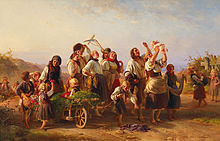Proletariat
In ancient Rome, the proletariat (from the Latin proles 'the offspring') referred to the social class of landless and propertyless wage-dependent but not enslaved citizens in the city-state who were not liable to taxation or military service. Adopted from Latin, the term first appeared in England in the 19th century, and later in other European countries, but it was not until the French Revolution that it was hesitantly used to refer specifically to the Fourth Estate (more correctly, to the lower classes not belonging to any of the three estates). Around 1820 Henri de Saint-Simon speaks for the first time of the class of proletarians. Since 1830, the term has been used to refer to the pauperized lower classes, seen as a threat to social and political stability. This is done, for example, by Lorenz von Stein, who sees the danger in the need of the property- and education-less proletarians "not to remain entirely without those goods which give personality its value in the first place." Since about the middle of the 19th century, the term has found preferential application to the industrial workforce that emerged as a result of the Industrial Revolution. According to Karl Marx, proletarians are doubly free wage-labourers, people who possess nothing but their labour-power, who can therefore earn their predominant living solely by selling their labour-power.
From the Marxist worldview, in a capitalist society they stand in irreconcilable opposition to the owning class, the bourgeoisie.
While sociology today speaks of the new proletariat, the term proletariat itself is hardly used in everyday language. However, in simple colloquial language the terms derived from it, "proletarian" or more recently "chav", are commonly used as swear words or discriminatory terms. Behind these terms are cliché-like pejorative attributions. The term "Prolet" and in particular the term "Proll" are comparatively blurred and in their use are sometimes considerably removed from the designation of a social group in the sociological sense (stratum, class, milieu); they usually associate (instead of economic inequality) rather cultural evaluations, on the one hand in the sense of coarse, vulgar, not cultivated, uneducated or even barbaric or cultureless, sometimes also in distinction to intellectual, on the other hand in the sense of ostentatious, resp. boasting with coarse, unrefined fashion objects or behaviors.
.jpg)
"The Fourth Estate" (1901) by Giuseppe Pellizza da Volpedo is among the most famous depictions of the modern proletariat.
Etymology
The German term Proletariat comes from the Latin term proletarius. Following the original meaning of the word, proletarius means "concerning the offspring". Derived from this, the modern meaning of the word can be derived: the proletariat is the population group that "supports the state only with its offspring and not with its wealth.

Homecoming Reapers by Jakob Becker: A Romantic Painter's View of the Rural Proletariat in the 19th Century
The proletariat in ancient Rome
During the expansion phase of the Imperium Romanum, slaves were brought to Rome en masse as spoils of war and used as agricultural labourers on large estates. Since these large farms produced much more efficiently than the small peasantry, the latter lost its livelihood. Small farmers moved to the capital, where they lived as landless but still free Roman citizens alongside the noble patricians and the non-noble plebeians (mainly peasants and artisans). Since they no longer possessed anything except their right to vote, the proles sold this in exchange for food to the wealthy upper class.
Search within the encyclopedia